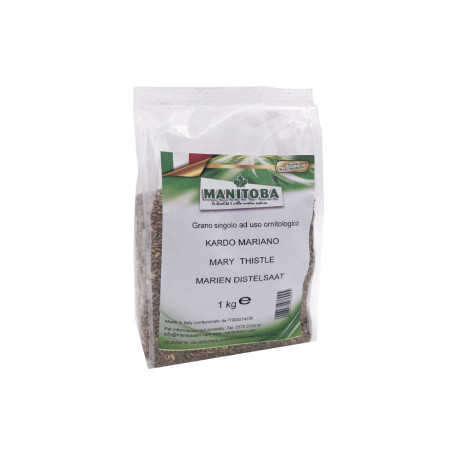- In the process of being restocked




Reference: 3694/S
Improves liver and overall health of birds.
Suitable for a wide range of birds, including parrots, canaries, budgerigars, and other exotic birds.
Benefits for birds:
- Liver support.
- Detoxification: Helps eliminate toxins from the liver and improves digestion.
- Strengthening the immune system.
Instructions for use:
Dosage: Add a small amount (usually a teaspoon per day) to the birds' usual seeds. The amount may vary depending on the size and specific needs of the birds. Can be mixed with the birds' daily food.
Precautions:
Store in a cool, dry place, away from moisture and direct sunlight.
Improves the liver and overall health of birds.
Suitable for a wide range of birds, including parrots, canaries, budgerigars, and other exotic birds.
Benefits for birds:
- Liver support.
- Detoxification: Helps to eliminate toxins from the liver and improve digestion.
- Immune system boost.
Directions for use:
Dosage: Add a small amount (usually a teaspoon per day) to the birds' regular seeds. The amount may vary depending on the size and specific needs of the birds. Can be mixed with the birds' daily food.
Precautions:
Store in a cool, dry place, away from moisture and direct sunlight.
Analytical Composition of Milk Thistle:
- Proteins: Approximately 16-25%
- Fats: Approximately 25-35%
- Crude fibres: Approximately 30-35%
- Moisture: Approximately 8-10%
- Ash: Approximately 4-5%
- Carbohydrates: Approximately 15-20%
- Silymarin: Main active component, typically between 1.5-3% (composed of flavonolignans such as silibinin, silicristin, silidianin)
- Vitamins and minerals:
- Vitamin E
- Vitamin
- Selenium
- Calcium
- Magnesium
- Potassium
- Iron
The evening primrose is an annual or biennial, rustic, which can be found naturally at the edge of paths near the Atlantic and Mediterranean coasts but also on the embankments of railways. Its erect stems are lined with large rosettes of downy leaves veined with red, between 10 and 30 cm long, oblong in shape, lanceolate, toothed, a little sticky.
The green Pagima ensures the good health of your birds. Pagima green promotes the functioning of the intestines, thus ensuring better digestion. Pagima is also credited with a preventive action against inflammations of different types that threaten your birds, it is rich in vitamins and fiber, its smell is pleasant and its taste delicious.
Foniopaddy Seed is a natural grass seed grown on our plantations in Uganda. Scientific research has shown that Foniopaddy has a beneficial effect on coccidiosis.
Seed rich in protein, mainly present in pigeon mixes, appreciated by pigeons.
Flaxseed is rich in omega 3, which is essential for the cardiovascular system.
Clover stimulates the immune system and slows down cellular ageing through its excellent antioxidant properties. Rich in vitamins B, C, E and provitamin A.
These seeds rich in lipids and proteins are especially appreciated by wild birds. They will attract sizerins, reeds, goldfinches, black-headed chickadees, sparrows, sad doves and a host of other birds to your garden. It is often used as a replacement for the more expensive shuttle.
The canary seed is a grass, an annual plant up to 1m tall, the seeds being found in the inflorescences. These seeds represent a significant fraction of the majority of bird mixtures.
• Excellent for canaries, European and exotic birds, wavy parakeets and large parakeets.
• EXTRA canary seed has undergone extra cleaning and is of exceptional quality. Unique on the market!
They have the property of binding to minerals such as calcium, iron and zinc and making them less bioavailable.
High-quality seeds with high fat content
- With a high content of vitamin E, B9, B5, B6, B1, B2, B3, and vitamin K.
- It has antioxidant properties.
- Excellent energy contribution.
- Rich in calcium, potassium, magnesium, phosphorus, proteins, zinc, thiamine, pectin (cleanses the body).
Onion seeds are rich in minerals, vitamins, and antioxidants.
The Cardy seed is rich in protein and linoleic acid, which helps reduce cholesterol levels and therefore decreases the risk of heart disease. It is found in mixes for budgerigars and parrots, but also for native birds such as bullfinches.
Cardy seeds are high in fat. The amino acid proportions of the seed are very favourable, with a very high arginine content. The seed is low in lysine and methionine + cystine, while tryptophan is completely lacking.
High-quality seeds with a high fat content.
- With a high content of vitamin E, B9, B5, B6, B1, B2, B3, and vitamin K.
- It has antioxidant properties.
- Excellent energy contribution.
- Rich in calcium, potassium, magnesium, phosphorus, proteins, zinc, thiamine, pectin (cleanses the body).
The 1 kg white Perilla from the Manitoba brand is a high-quality food specially designed for birds.
Features and Benefits:
- Natural and Pure: White perilla is a natural, pure, and untreated seed, offering a healthy source of nutrition for birds.
- Rich in Nutrients: It is particularly rich in omega-3 fatty acids, essential for the overall health of birds, especially for their cardiovascular and immune systems.
- Plumage Health: Regular consumption of white perilla helps maintain shiny and healthy plumage thanks to its nutritional properties.
Chicory seeds (cichorium intybus) are among the health seeds that come from wild plants. These seeds are rich in fiber and minerals and help maintain intestinal balance.
They purify the body and are also effective in cases of indigestion.
Seeds for canaries and exotic and native birds.

Improves liver and overall health of birds.
Suitable for a wide range of birds, including parrots, canaries, budgerigars, and other exotic birds.
Benefits for birds:
- Liver support.
- Detoxification: Helps eliminate toxins from the liver and improves digestion.
- Strengthening the immune system.
Instructions for use:
Dosage: Add a small amount (usually a teaspoon per day) to the birds' usual seeds. The amount may vary depending on the size and specific needs of the birds. Can be mixed with the birds' daily food.
Precautions:
Store in a cool, dry place, away from moisture and direct sunlight.
